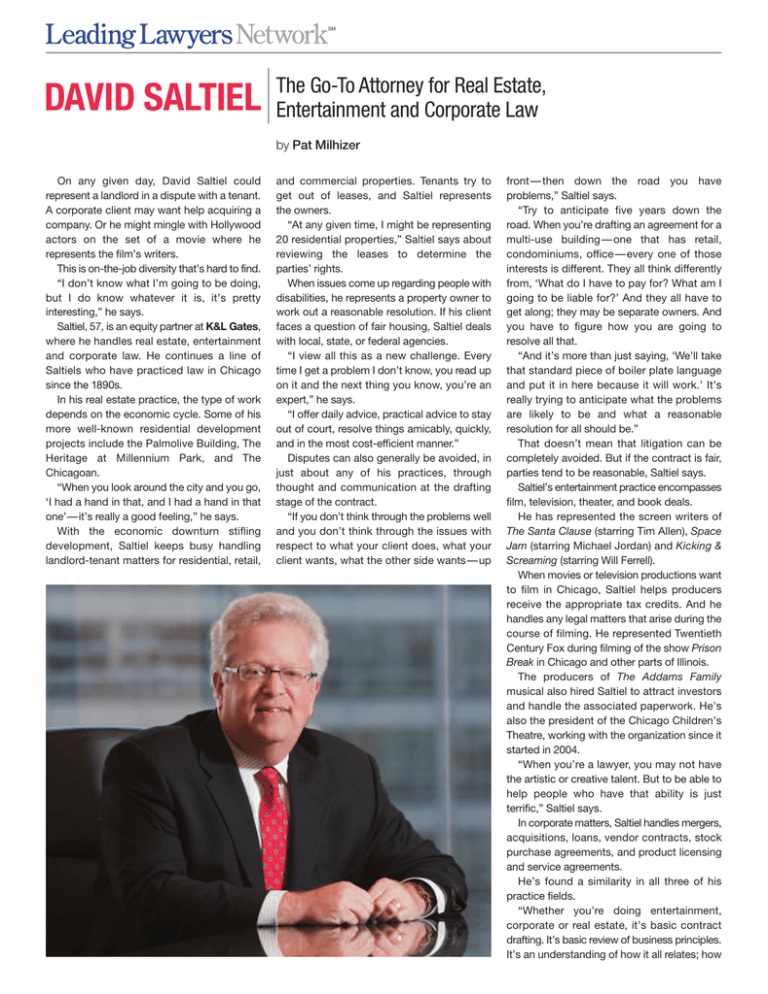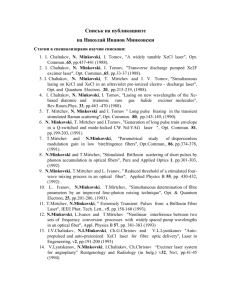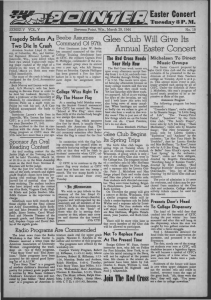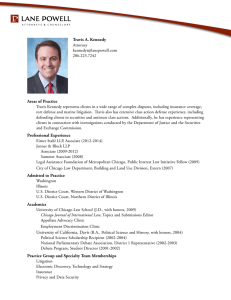DAVID SALTIEL The Go-To Attorney for Real Estate, Entertainment and Corporate Law
advertisement

SM DAVID SALTIEL The Go-To Attorney for Real Estate, Entertainment and Corporate Law by Pat Milhizer On any given day, David Saltiel could represent a landlord in a dispute with a tenant. A corporate client may want help acquiring a company. Or he might mingle with Hollywood actors on the set of a movie where he represents the film’s writers. This is on-the-job diversity that’s hard to find. “I don’t know what I’m going to be doing, but I do know whatever it is, it’s pretty interesting,” he says. Saltiel, 57, is an equity partner at K&L Gates, where he handles real estate, entertainment and corporate law. He continues a line of Saltiels who have practiced law in Chicago since the 1890s. In his real estate practice, the type of work depends on the economic cycle. Some of his more well-known residential development projects include the Palmolive Building, The Heritage at Millennium Park, and The Chicagoan. “When you look around the city and you go, ‘I had a hand in that, and I had a hand in that one’—it’s really a good feeling,” he says. With the economic downturn stifling development, Saltiel keeps busy handling landlord-tenant matters for residential, retail, and commercial properties. Tenants try to get out of leases, and Saltiel represents the owners. “At any given time, I might be representing 20 residential properties,” Saltiel says about reviewing the leases to determine the parties’ rights. When issues come up regarding people with disabilities, he represents a property owner to work out a reasonable resolution. If his client faces a question of fair housing, Saltiel deals with local, state, or federal agencies. “I view all this as a new challenge. Every time I get a problem I don’t know, you read up on it and the next thing you know, you’re an expert,” he says. “I offer daily advice, practical advice to stay out of court, resolve things amicably, quickly, and in the most cost-efficient manner.” Disputes can also generally be avoided, in just about any of his practices, through thought and communication at the drafting stage of the contract. “If you don’t think through the problems well and you don’t think through the issues with respect to what your client does, what your client wants, what the other side wants — up front — then down the road you have problems,” Saltiel says. “Try to anticipate five years down the road. When you’re drafting an agreement for a multi-use building — one that has retail, condominiums, office — every one of those interests is different. They all think differently from, ‘What do I have to pay for? What am I going to be liable for?’ And they all have to get along; they may be separate owners. And you have to figure how you are going to resolve all that. “And it’s more than just saying, ‘We’ll take that standard piece of boiler plate language and put it in here because it will work.’ It’s really trying to anticipate what the problems are likely to be and what a reasonable resolution for all should be.” That doesn’t mean that litigation can be completely avoided. But if the contract is fair, parties tend to be reasonable, Saltiel says. Saltiel’s entertainment practice encompasses film, television, theater, and book deals. He has represented the screen writers of The Santa Clause (starring Tim Allen), Space Jam (starring Michael Jordan) and Kicking & Screaming (starring Will Ferrell). When movies or television productions want to film in Chicago, Saltiel helps producers receive the appropriate tax credits. And he handles any legal matters that arise during the course of filming. He represented Twentieth Century Fox during filming of the show Prison Break in Chicago and other parts of Illinois. The producers of The Addams Family musical also hired Saltiel to attract investors and handle the associated paperwork. He’s also the president of the Chicago Children’s Theatre, working with the organization since it started in 2004. “When you’re a lawyer, you may not have the artistic or creative talent. But to be able to help people who have that ability is just terrific,” Saltiel says. In corporate matters, Saltiel handles mergers, acquisitions, loans, vendor contracts, stock purchase agreements, and product licensing and service agreements. He’s found a similarity in all three of his practice fields. “Whether you’re doing entertainment, corporate or real estate, it’s basic contract drafting. It’s basic review of business principles. It’s an understanding of how it all relates; how SM litigation ties into the contracts you’re drafting,” Saltiel says. Working His Way Up Growing up in Highland Park, Saltiel was the younger of two children. “My father taught me integrity. It’s always about how you treat people; how you do things. And don’t ever let your integrity be questioned,” he says. Across the street from his boyhood home sits Ravinia Festival, the outdoor amphitheater. From 5 to 12 years old, Saltiel crawled under a fence to listen to various musicians’ and Chicago Symphony Orchestra rehearsals. A trumpet player, Saltiel was thrilled to meet Louis Armstrong in 1967. Ravinia was an obvious place for him to work, and he started on the maintenance and cleaning crew when he turned 15. “In the 60s, some of the stuff that was going on, on the lawn; we found everything,” Saltiel says. He ultimately worked his way up to assistant box office manager — a job he would hold through law school. One summer, he played in a band with Gary Sinise, who worked in the mail order department with John Malkovich. “It’s affected everything in a good way,” Saltiel says about Ravinia. So good, in fact, that Saltiel now provides legal counsel to Ravinia. The park’s management calls him to review contracts for musicians and construction projects. “When we have a legal question, we call Dave,” says Ravinia General Manager Pat Sanders. “He knows the industry, and he knows our organization so well. “He is so thoughtful and so thorough and so logical. And I think some people might say ‘Aren’t lawyers always logical?’ But no, they’re not. He views everything in terms of what the interpretation and application of what the law should be. And he can immediately zero in on how it applies.” After graduating from the University of Michigan with a business degree in 1975, Saltiel earned a degree from the University of Illinois College of Law. The job search wasn’t easy. “You’d send out 125 resumes in the hopes of getting five interviews in the hopes of getting one or two job offers. And that’s really what happened. I was lucky enough to get a job at an absolutely perfect firm for me,” he says. In 1979, Saltiel became one of the 16 lawyers at Greenberg, Keele, Lunn, & Aronberg. He started out handling contract work and litigation, which he didn’t really enjoy. But he realized he needed to understand how the litigation process works so he could help any future client avoid the courtroom if possible. Leading the firm was Frank Greenberg, a past president of Chicago Bar Association, who Saltiel says possessed an incredible intellect. And Greenberg was tough. Saltiel recalls working on projects through a weekend, only to come to the office on Monday and hear Greenberg tell him that he wasn’t done. Then, Greenberg took him and other young lawyers out to dinner. “You realized this was all an exercise to him to make you really a great lawyer. It wasn’t an ego thing, not with him. It was just — this is part of the exercise to make you the best. And being second-best isn’t good enough,” Saltiel says about Greenberg, who is deceased. Saltiel made partner at the firm. But after a personality conflict with a managing partner in front of a client, he decided to move on. With attorney Larry Mages, Saltiel moved to Bell, Boyd & Lloyd in 1988. Mages refers to Saltiel’s smarts, business degree, and calm approach as reasons why clients keep coming back to him. “There are a lot of lawyers that know their way around a contract or a lease. What David brings is his business background and approach. When he is negotiating something, he understands the real world business ramifications of what he’s talking about,” Mages says. Saltiel, he says, doesn’t get hung up on the “commas” but rather the broader issues of “how it can affect his client and his business. His approach is a very practical one. And he’s not a flappable kind of guy, doesn’t get excited by every little thing. So it makes him easy to work with.” Mages also credits Saltiel for having a diverse legal background. “His entertainment practice, which is what he loves. He has vast experience in real estate. He can probably write your will. He can talk to judges. He knows what’s in the tax code. He has been involved in corporate work,” Mages says. “When David is your lawyer, he’s not referring you out to his partner that specializes in tax or this and that. David will understand it and be able to give guidance on the entire scope of the issue or a problem or a deal.” In 2008, Bell, Boyd & Lloyd merged with K&L Gates. ‘It’s Gotta Be Fun’ For Saltiel, the best part of the job is the fact that his clients are his friends. “You know when the phone rings, it’s going to be fun,” Saltiel says. “I love picking up the phone, and I love working with the people I work with. Not only the clients but also the people here. We’ve got a very good (real estate) department.” “I always tell my kids, ‘You have to have passion for what you do.’ It’s gotta be fun. If what you’re doing isn’t fun, stop doing it.” Married for 26 years after meeting his wife, Sandy, on a blind date, Saltiel has two adult children. He also serves as a trustee on the village board in Lincolnshire, where he’s lived since 1985. When challenges arise at work, the difficulty is typically finding a result that works for both parties. “Sometimes, you can’t figure out the other side. My feeling has always been if you put yourself in the shoes of the people you’re negotiating against, it helps you understand what a reasonable compromise position might be,” Saltiel says. “Whether it’s negotiating a contract, whether it’s settling litigation, whether it’s settling an ADA (Americans with Disabilities Act) complaint or a fair housing complaint — what do they really want? What is the result that gets everybody what they want?” When a property-owning client is sued by a plaintiff who alleges that he or she was injured on the property, there are times that Saltiel knows the only way to solve the problem is with money. “But if there isn’t a basis for giving that money, we’re not going to do it. That’s frustrating. But it’s only frustrating because I can’t get to a fair and reasonable resolution,” he says. During negotiations on any dispute or contract, both sides immediately start at opposite ends, Saltiel says. “In a lot of these negotiations and entertainment deals, we know where it’s going to end up almost before we get started. But you can’t start in the middle because the feeling is you’ll lose ground,” he says. “So you start ‘over here.’ They start ‘over there,’ and then you get to the middle. But it’s really silly. And it’s the dance that oftentimes you have to do.” Stanley Sklar, an arbitrator and adjunct law professor, worked with Saltiel at Bell, Boyd & Lloyd for about a dozen years. Sklar concentrated on construction law, and even though it wasn’t one of Saltiel’s specialties, Sklar occasionally approached Saltiel for advice on a matter. “Dave is probably one of the best business lawyers that I have ever known,” Sklar says. “He has a knack for zeroing in on the issues clearly and quickly and has always put his clients ahead of himself. “I always found him available when I had a particular problem that was troubling me. Just sitting and talking to him made me focus on what was best for the client. “If I had a business problem, he’s the lawyer I would go to.” ■ This article originally appeared in Leading Lawyers Network Magazine—Real Estate, Construction and Environmental Edition for 2012 and has been reprinted with permission. © 2012 Law Bulletin Publishing Co.




